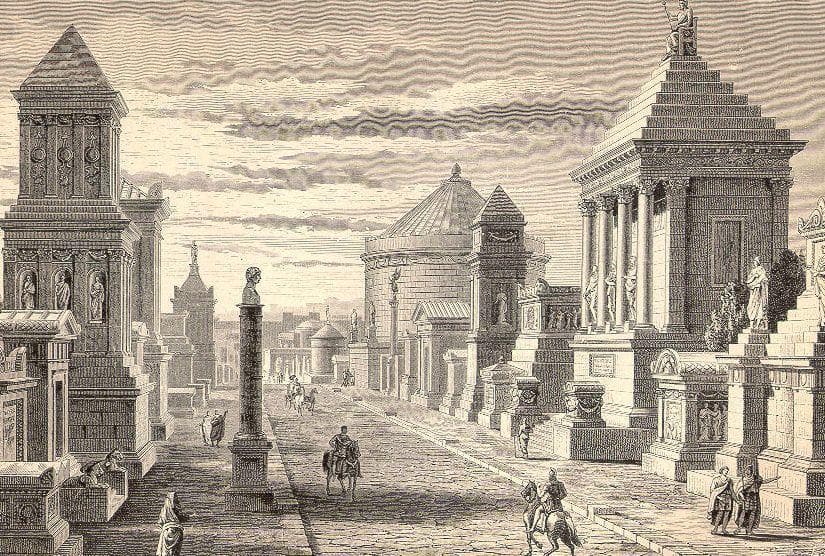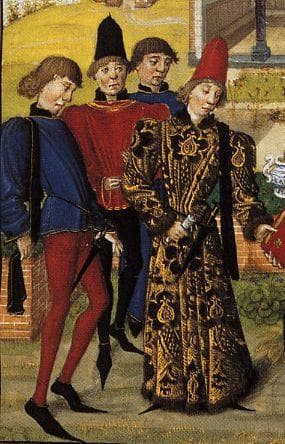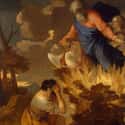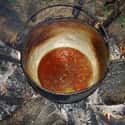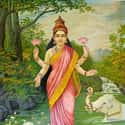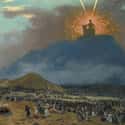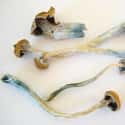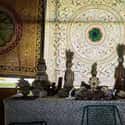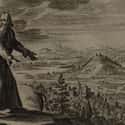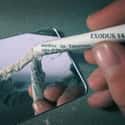-
(#1) The Effects Of The Plants May Explain A Few Very Important Biblical Moments
Dr. Shanon claims that two of the major events that most people know Moses for in the Bible occurred while he was possibly under the influence of hallucinogenics. Those events are the receiving of the Ten Commandments on Mount Sinai and the encounter with the burning bush with which he had a conversation.
He also experienced things throughout the Book of Exodus that include bright light and the sound of trumpets, visual and auditory sensations that can be experienced through drug use.
-
(#2) Moses Experienced Common Side Effects Of Someone Who Has Taken Ayahuasca
Dr. Shanon came up with the hypothesis that Moses and his fellow Israelites were in an "altered state of consciousness" when they experienced God at Mount Sinai. According to Shanon, the effects of ayahuasca consumption can result in hallucinations, which can include seeing light and experiencing intense religious feelings.
Shanon posits that experiencing seeing a bright while also feeling deep religious connections can give one the illusion of seeing God.
-
(#3) The Use Of Hallucinogens May Have United The People Of Israel
Although his theory has been somewhat divisive for the religious community, Shanon believes that the use of hallucinogens may have been a uniting factor for the early people of Israel. He stated that opinion in an interview with Israel Radio:
"As far as Moses on Mount Sinai is concerned, it was either a supernatural cosmic event, which I don't believe, or a legend, which I don't believe either, or finally, and this is very probable, an event that joined Moses and the people of Israel under the effects of narcotics."
-
(#4) The Two Plants Found On The Sinai Peninsula Are Also Used In Ayahuasca Ceremonies
Ayahuasca contains two key ingredients, DMT and MAO, that give it its hallucinogenic effect; two plants in the Sinai region contain the same ingredients. The Acacia bush contains DMT, and the Peganum harmala bush contains MAO. The ancient Israelites would have had access to both critical plants.
There are always very specific preparations made for ayahuasca ceremonies, and similar preparations have actually been described in the book of Exodus in the Bible, in relation to the Mount Sinai events.
-
(#5) Drugs Can Be Instruments To Develop Religious Understanding
In the Amazon region, ayahuasca is used in religious ceremonies. Although ayahuasca - along with the plants used by the early Israelites - is a mind-altering substance, Shanon is adamant that using it can be an experience that brings a deeper understanding of God.
"The plants were universally regarded as sacred, even divine, and held to be the source of true knowledge and the very foundation of the cultures in question. Their consumption is a lifelong engagement."
-
(#6) "Entheogens" Pop Up Throughout Religious History
From Siberia to Mexico, drugs were used in ancient religious ceremonies to gain a better connection to the spiritual world.The term "entheogen" was coined by ethnobotanists in 1979, as a way to better describe the use of drugs for religious reasons. The definition of "entheogen" is "that which causes God to be within an individual."
Some of the oldest religious texts in the world are the ancient Hindu Vedas. They mention a drug called "soma," who's identity remains unknown. However, it is described as a plant (made into a drink) that would give those who consumed it otherworldly power as well as improved communication with the deities.
-
(#7) Dr. Shanon Put Together A Groundbreaking Theory About Psychoactive Plants And The Bible
Dr. Shanon received his PhD in experimental psychology from Stanford University, and is a professor of psychology at the Hebrew University of Jerusalem. He wrote a book about his numerous research experiences with a drug called ayahuasca, called Antipodes of the Mind.
He became well-known for his "Biblical Entheogen Hypothesis," which laid out the argument that Moses was under the influence of psychoactive drugs during very important moments in the Old Testament of the Bible.
-
(#8) How These Plants Affect The Human Body
The chemicals present in ayahuasca can make a person "see, hear, smell, feel or taste things that aren’t really there or cause the person to experience things differently from how they are in reality."
The ingredient dimethyltryptamine (DMT) is not orally active because there is a compound in the digestive tract that destroys it, called monoamine oxidase (MAO). Because the ayahuasca tea contains a MAO inhibitor, the hallucinogenic DMT can then enter the circulatory system and be absorbed into the brain.
-
(#9) There Is Little Concrete Proof That Hallucinogenic Mushrooms Were Used The Sinai Region
The studies done by Dr. Benny Shanon focused on bushes with potentially psychedelic properties, but some people theorize that mushrooms also played a role in prehistoric culture and early spirituality. However, the evidence to prove the various mushroom claims is sparse- especially for the "Jesus was a mushroom" theory.
There have been reports of mushroom consumption in the Sahara desert region around 7,000 years ago, but nothing specific indicating their use in the Sinai region.
-
(#10) Shanon's Research On The Use Of Psychoactive Plants In Religious History Doesn't Affect His Respect For Religion
If anyone can claim to be an expert on ayahuasca, it's Dr. Benny Shanon. He has participated in around 160 ayahuasca ceremonies for the purpose of researching the effects on the body and mind.
While some might feel uncomfortable with the idea that key Biblical figures were under the influence of intoxicants, Dr. Shanon sees it very differently. When The Guardian posted articles that painted his research as disparaging to Moses and significant moments in the Bible, he wrote back to clear some things up.
"I would like to assure you that I have the deepest respect for Moses, the Jewish tradition and religious faith in general. As stated in my book The Antipodes of the Mind, the most important effect the experiences with ayahuasca have had on me as a person was making me understand the dimension of the holy."
-
(#11) Shanon Considers The Effects To Be Neither Good Nor Bad, It Depends On The Individual
In his letter to The Guardian, Dr. Shanon defends his research on the hallucinogenic drugs from the Sinai region. While some people have serious doubts, he believes that the drugs can be a force for good, and a positive part of people's religious lives.
"Psychoactive agents are not good or bad in themselves; rather their value depends on their usage."
-
(#12) In Spite Of Shanon's Theory, Many Bible Verses Take A Hard Stance On Drug Use
Although there is no specific mention in the Bible of drugs of any kind whatsoever (mainly because most are either modern creations, or have modern names), religious scholars point out that the Bible is still very clear regarding drug use.
One line of reasoning involves the mandate (which comes up many times throughout the text), that citizens should not disobey laws. Since there are laws against drug use in most countries today, that would mean that drug use is out of the question for Christians.
New Random Displays Display All By Ranking
About This Tool
Moses was the national leader of the Israelis, and historians believe that he was the founder of Judaism. Some researchers claim that Moses and the Israelis took drugs in the legend of crossing the desert. According to Benny Shannon, professor of Israeli cognitive philosophy at Hebrew University, this detail can explain Moses’ vision of accepting God’s Ten Commandments. The Bible does not directly talk about any form of illegal drug use.
Under the leadership of Moses, the ancient Israelites got rid of the tragic fate of being enslaved, learned to abide by the Ten Commandments, and became the first nation in history to have a monotheistic religion. The random tool explained 12 details about Moses may have been on drugs.
Our data comes from Ranker, If you want to participate in the ranking of items displayed on this page, please click here.

